2010 甘肃特岗教师招聘考试英语真题及答案
Part I: Vocabulary and structure (10%)
1. One day I__ a newspaper article about the retirement of an English professor
at a nearby state college.
A. came acrossB. came about
C. came after D. came at
2. She was complaining that the doctor was ____ too much for the treatment he
was giving her.
A. expending
B. offering
C. costing
D. charging
3. The manager spoke highly of such____as loyalty, courage and truthfulness
shown by his employees.
A. virtuesB. features
C. properties
D. characteristics
4. Since the matter was extremely____ , we dealt with it immediately.
A. tough
B. tense
C. urgent
D. instant
5. You don't have to be in such a hurry. I would rather you____on business first.
A. would goB. will go
C. went
D. have gone
6. When I try to understand____that prevents so many Americans from being as
happy as one might expect, it seems to me that there are two causes.
A. why it does
B. what it does
C. what it is
D. why it is
�
7. As early as 1647 Ohio made a decision that free, tax-supported schools must
be established in every town____50 households or more.
A. having
B. to have
C. to have had
D. having had
8. The newcomers found it impossible to____themselves to the climate
sufficiently to make permanent homes in the new country.
A. suit
B. adapt
C. regulate
D. coordinate
9. Living in the central Australian desert has its problems,____ __obtaining
water is not the least.
A. for which
B. to which
C. of
which
D. in which
10. I'm sure he is up to the job____ he would give his mind to it.
A. if only
B. in case
C. untilD. unless
Part II: Cloze
(10%)
In the waiting room, the patients, men and women, old and young, were sitting
12__ for their turns. Billy, a school boy, was sitting there,
11___ on the chairs,
too. They all looked very sad 13___ Billy. He
14___ an interesting story, and
there was a smile on his face. Just then, the doctor came in to say he was ready
for the next patient. Billy jumped up and ran into the
15__ room. “Good morning,
Doctor!” “Good morning! What's your 16__, young man?” asked the doctor. Before
Billy could say a word, the doctor made him
17__down on a bed. “Now, let me listen
anything. “ I’
to your heart.” Billy tried to speak, but the doctor told him
ll take your temperature.” Billy tried to sit up, but the doctor stopped
him. “Now
open your mouth. Mm, good.” After a moment, the doctor said, “Well, my boy, you
haven't got a bad cold. It's nothing. Mm, in fact, there is
with you.” “I
,”said the boy. “ I just came to get some medicine for my father.”
know there
19_
18
20_
11.A. quicklyB. quietly
C. luckily
D. noisily
12.A. waitingB. waited
C. to wait
D. wait
�
13.A. with B. and C. except
D. without
14.A. saw
B. was seeing C. readD. was reading
15.A. patients
B. waiting
C. sitting
D. doctor's
16.A. storyB. trouble
C. matter
D. wrong
17.A. to lie B. lay C. lyingD. lie
18.A. say
B. not to say C. not say
D. to say
19.A. wrong nothing
B. something wrong
C. nothing wrongD. wrong something
20.A. aren't B. are C. isn'tD. is
Part III: Reading Comprehension
(10%)
Passage One
In one way of thinking, failure is a part of life. In another way, failure may
be a way towards success. The “spider story ”often told, Robert Bruce, leader of
the Scots in the 13th century, was hiding in a cave from the English. He watched
a spider spinning a web. The spider tried to reach across a rough place in the rock.
He tried six times without success. On the seventh time he made it and went on to
spin his web. Bruce is said to have taken heart and to have gone on to defeat the
English. --- Edison, the inventor of the light bulb, made hundreds of models that
failed before he found the right way to make one.
So what? First, always think about your failure. What caused it? Were conditions
right? Were you in top form yourself? What can you change so things will go right
next time?
Second , is the goal (目标) you’re trying to reach the right one ? Try to do
some thinking about what your real goals may be. Think about this question, “If
I do succeed in this, where will it get me ?”This may help you prevent failure in
things you shouldn’t be doing anyway.
The third thing to bear in mind about failure is that it’s a part of life. Learn
to “live with yourself ”even though you may have failed. Remember, “You can’
t win at all.”
�
21. This passage deals with two sides of failure. In paragraph 1, the author
talks mainly about ___________.
A. the value of failure
B. how people would fail
C. famous failures
D. the cause of failure
22. The underlined phrase “made it ”means ________ .
A. succeeded
B. failed
C. gave
D. got
23. The lesson the spider taught Robert Bruce seems _________ .
A. productive
B. straight forward
C. sorrowful
D. deep
24. The author tells you to do all things except ________ .
A. to think about the cause of your failure
B. to check out whether your goals are right for you
C. to consider failure as a part of life
D. to bear in mind that you will never fail in your life
25. Which of the following is NOT true?
A. Bruce and Edison were successful examples.
B. Failure may be regarded as a way toward success.
C. Edison learned a lot from the lesson the spider taught Robert Bruce.
D. One may often raise a question whether his goals are worth attempting
Passage Two
While the private schools may be charging too much, some of the publics are
risking their futures by charging too little. Low tuition is fine, as the state
�
assigns enough money to education, as has generally been the case in Texas and
California. But for years, New Jersey’s legendary resistance to taxes condemned
Rutgers University to second-class status. “Of what real worth is a low-tuition
policy,” wrote Rutgers’ former president, the late Edward Bloustein, “If it dooms
students to an education below the quality they want and require?”
New York State’s students might ask themselves the same. A series of protests
pressured Governor Maria Cuomo into canceling a $200 rise in tuition last year
(prices haven’t gone up since 1983). And what’s the result? Greatly-reduced budgets,
shabby campuses, course restrictions, limited library hors and various new student
fees.
The irony of New York and other state systems is that the percentage of
higher-income students they serve is increasing at a phenomenal rate, says Arthur
Hauptman of the American Council on Education. Given this changing population, more
states should start playing the Robin Hood game increasing their sticker price,
discounting rates to low-income students and using the rest of the money to raise
the quality of their schools.
The middle-class melt and the betterment of public universities are still in
their very earliest stages. But these trends will intensify as the children of the
burdened boomers reach college age. For the academics, it’s a wake-up call. In the
next century, they’ll have to be affordable and good.
26. According to some critics, the low-tuition policy of public universities
might lead to____.
A.the middle-class melt
B. a credit crisis
C. a decline in the quality of education
D. the enrollment of second-class students
27. Public universities reduce the tuition because____.
A. they yield to the pressure of protesters
B. they get contributions from the rich
C. they get enough money from the state
D. they try to give lower-income students an opportunity
�
28. It can be inferred from the passage that____.
A. private universities will join in the thrice competition
B. public universities have to withdraw from the price competition
C. rich students find ways of paying less by taking the advantage of the policy
D. rich students should be entitled to equal opportunities as poor students
29. In order to maintain their high quality at the stone time of opening the
floor to low-income students, public universities have to ______.
A. enlist their students for some voluntary jobs
B. exert long-term effort to improve themselves
C. count upon the financial support from the government
D. increase the proportion of rich students and charge more from them
30. This passage is mainly about _____.
A. the Robin Hood game
B. ways of paying less for college education
C. difficult situation of public universities
D. financial aid to lower—income students
Part IV : Translation
(20%)
Section A: Translate the following Chinese into English
(15%)
31.我们得赶快,要不就会赶不上车了。
32.这支钢笔花了我不到两美元。
33.我每天需要 20 分钟读英语。
34.他已经够上学的年龄了。
�
35.中国决不会第一个使用核武器。
Section B: Translate the following English into Chinese
(5%)
We have only to look behind us to get some sense of what may lie ahead. No one
looking behind ahead 20 years possibly could have foreseen the ways in which a single
invention, the chips would transform our world thanks to its applications in personal
computers, digital communications and factory robots. Tomorrow’s achievements in
biotechnology, artificial intelligence or even some still unimagined technology
could produce a similar wave of dramatic changes. But one thing is certain:
information and knowledge will become even more vital, and the people who possess
it, whether they work in manufacturing or services, will have the advantage and
produce the wealth. If you cast your mind ahead 10 years, information services will
be predominant. It will be the way you do your job.
英语一部分(50 分)
Part I: Vocabulary and Structure
(10 %)
1. A
2. D
3. A
4. C
5. C
6. C
7. A
8. B
9. C
10. A
Part II: Cloze
(10%)
11.B
12.A
13.C
14.D
15.D
16.B
17.D
18.B
19.C
20.C
Part III: Reading Comprehension
(10%)
21. A
22. A
23. D
24. D25. D
26. C
27. C
28. B
29. D30. D
Part IV : Translation
(20%)
Section A: Translate the following Chinese into English
(15%)
31.Hurry up, or we won’t catch the bus.
32.I paid less than 2 dollars for the pen.
�
The pen costs me less than 2 dollars.
I spent 2 dollars on the pen.
33.It takes me twenty minutes to read English.
I spend twenty minutes reading English.
34.He is old enough to go to school.
35.At no time will China be the first to use nuclear weapon.
Section B: Translate the following English into Chinese
(5%)
参考答案
Part I: Vocabulary and Structure
(10 %)
1. A
2. D
3. A
4. C
5. C
6. C
7. A
8. B
9. C
10. A
Part II: Cloze
(10%)
11.B
12.A
13.C
14.D
15.D
16.B
17.D
18.B
19.C
20.C
Part III: Reading Comprehension
(10%)
21. A
22. A
23. D
24. D25. D
26. C
27. C
28. B
29. D30. D
Part IV : Translation
(20%)
Section A: Translate the following Chinese into English
(15%)
31.Hurry up, or we won’t catch the bus.
32.I paid less than 2 dollars for the pen.
The pen costs me less than 2 dollars.
�
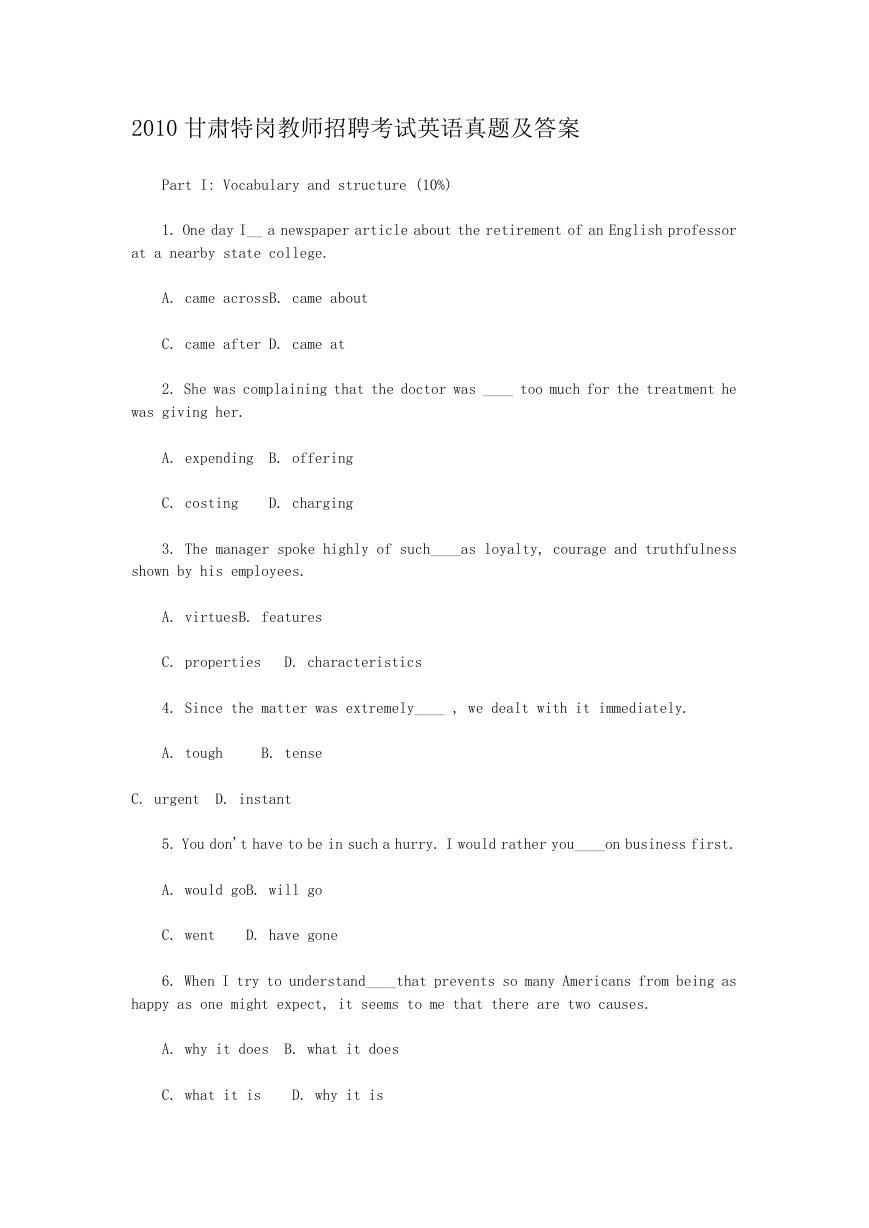


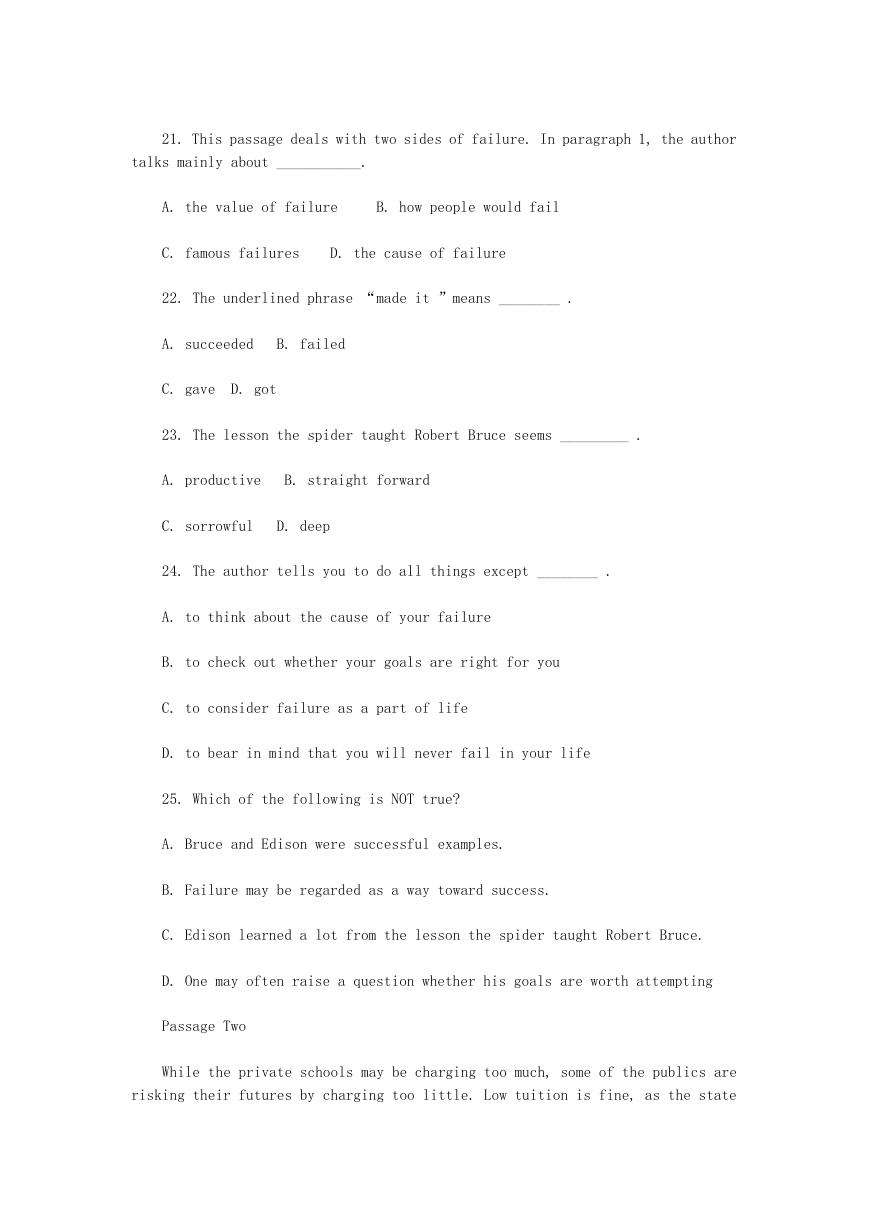
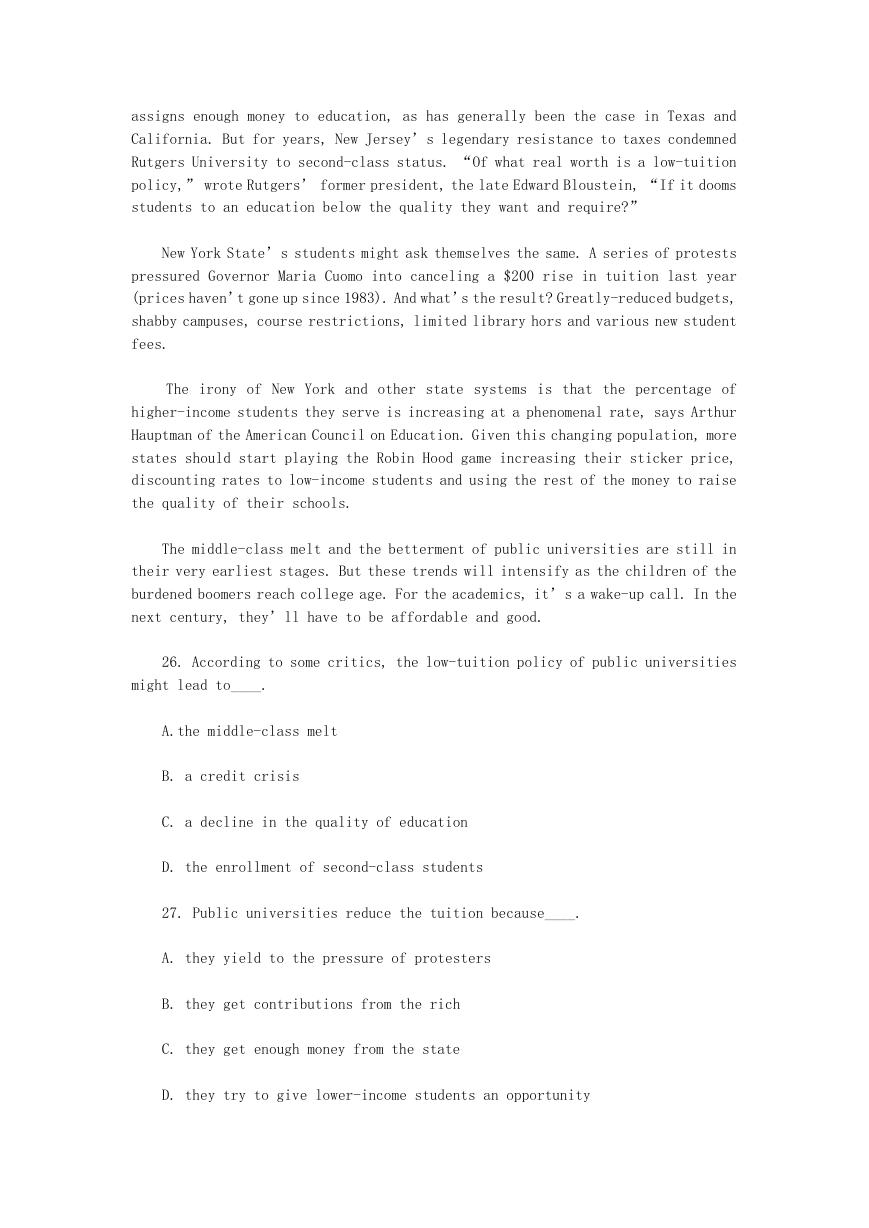
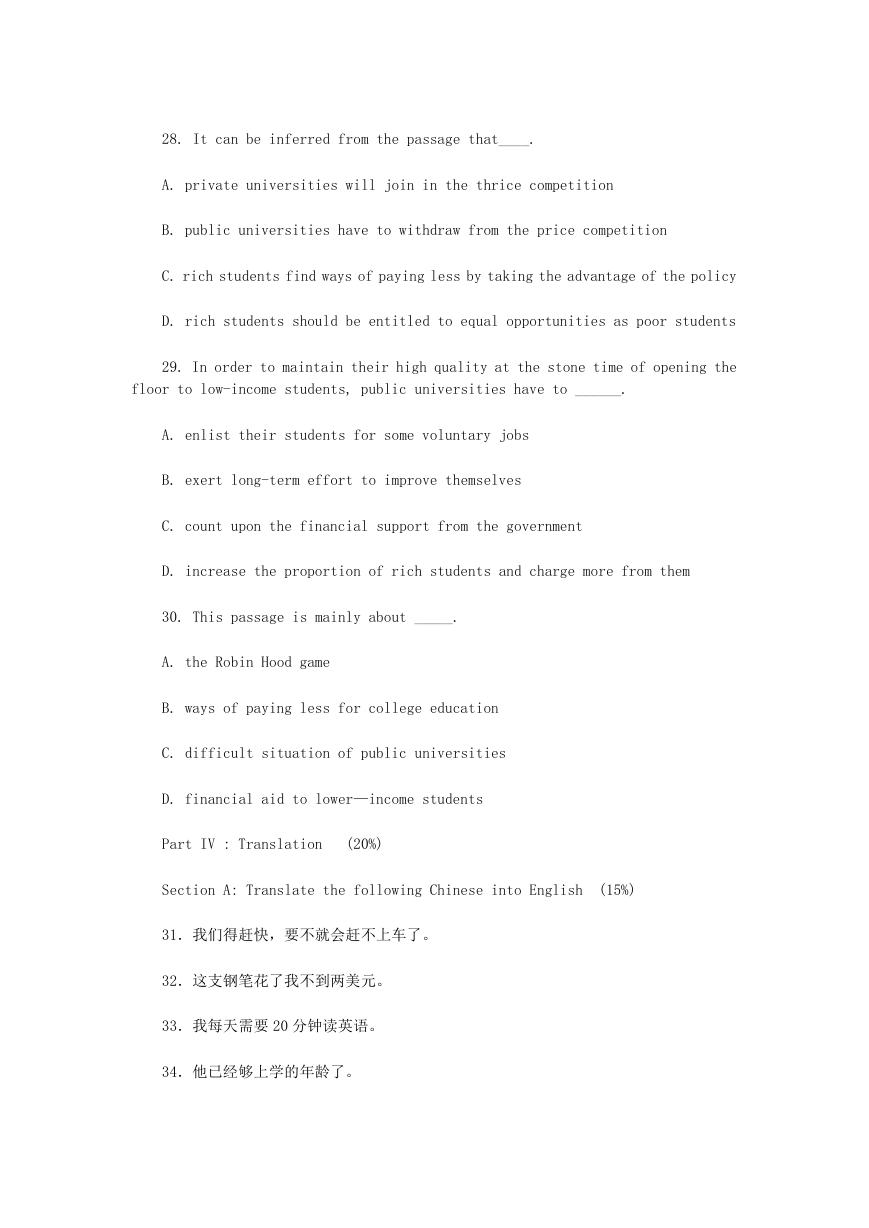

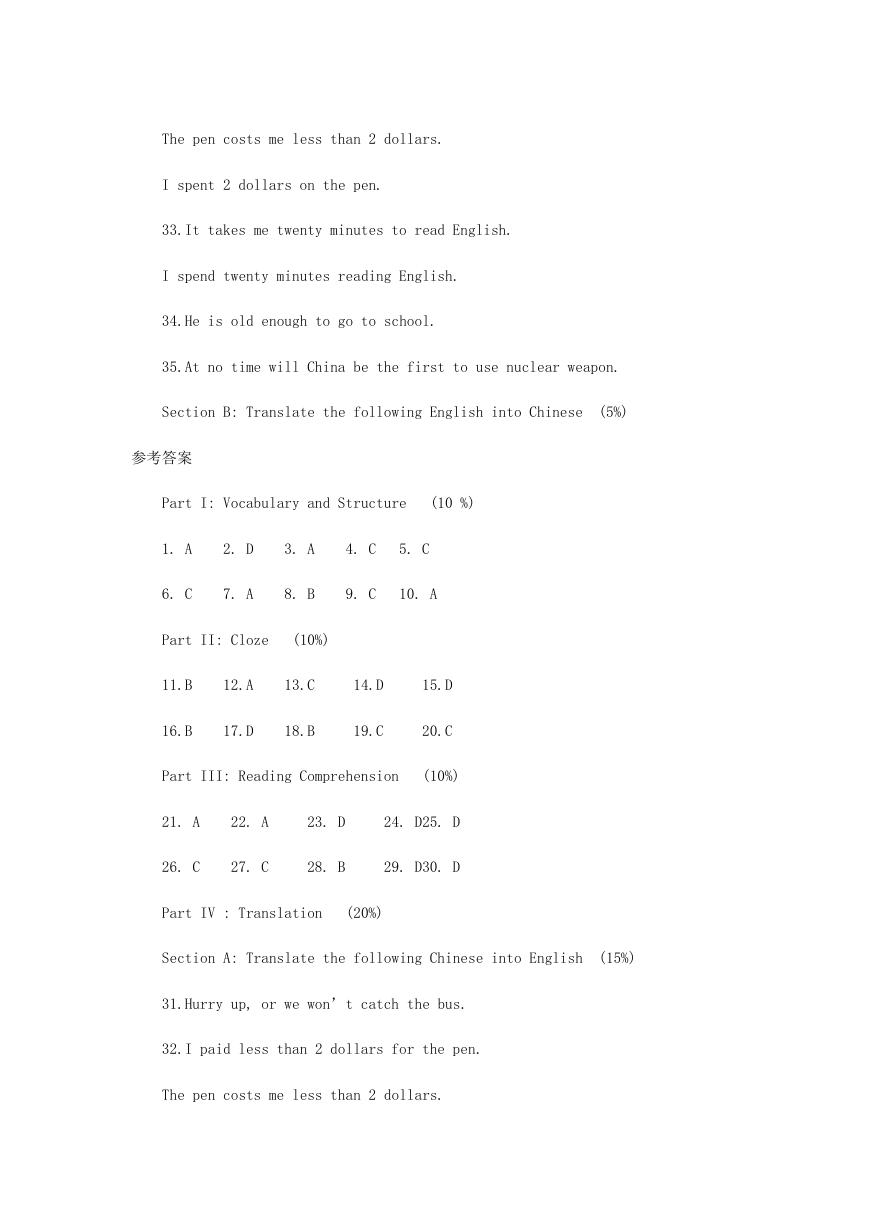








 2023年江西萍乡中考道德与法治真题及答案.doc
2023年江西萍乡中考道德与法治真题及答案.doc 2012年重庆南川中考生物真题及答案.doc
2012年重庆南川中考生物真题及答案.doc 2013年江西师范大学地理学综合及文艺理论基础考研真题.doc
2013年江西师范大学地理学综合及文艺理论基础考研真题.doc 2020年四川甘孜小升初语文真题及答案I卷.doc
2020年四川甘孜小升初语文真题及答案I卷.doc 2020年注册岩土工程师专业基础考试真题及答案.doc
2020年注册岩土工程师专业基础考试真题及答案.doc 2023-2024学年福建省厦门市九年级上学期数学月考试题及答案.doc
2023-2024学年福建省厦门市九年级上学期数学月考试题及答案.doc 2021-2022学年辽宁省沈阳市大东区九年级上学期语文期末试题及答案.doc
2021-2022学年辽宁省沈阳市大东区九年级上学期语文期末试题及答案.doc 2022-2023学年北京东城区初三第一学期物理期末试卷及答案.doc
2022-2023学年北京东城区初三第一学期物理期末试卷及答案.doc 2018上半年江西教师资格初中地理学科知识与教学能力真题及答案.doc
2018上半年江西教师资格初中地理学科知识与教学能力真题及答案.doc 2012年河北国家公务员申论考试真题及答案-省级.doc
2012年河北国家公务员申论考试真题及答案-省级.doc 2020-2021学年江苏省扬州市江都区邵樊片九年级上学期数学第一次质量检测试题及答案.doc
2020-2021学年江苏省扬州市江都区邵樊片九年级上学期数学第一次质量检测试题及答案.doc 2022下半年黑龙江教师资格证中学综合素质真题及答案.doc
2022下半年黑龙江教师资格证中学综合素质真题及答案.doc